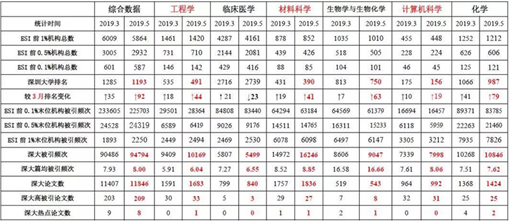According to the latest Essential Science Indicators (ESI) data, released on May 10, 2019, Shenzhen University’s international ranking is 1193, climbing 92 places compared to March this year, and ranking 75th among domestic universities and 6th among Guangdong universities. This time, six disciplines in our university were rated the ESI top 1% disciplines, and three were selected as the top 0.5%.

ESI is a database of research analysis based on more than 10 million document records of more than 12,000 academic journals in the world, which are included in the Web of Science (SCIE/SSCI). ESI provides a basic analytical evaluation tool for measuring scientific research performance and tracking scientific development trends. It is also recognized as one of the “world standards” for measuring world-class universities and disciplines. The data covers the period from January 1, 2009 to February 28, 2019, and currently lists 5,864 scientific institutions around the world. The six disciplines of Shenzhen University listed in ESI’s top 1% disciplines are: Engineering, Clinical Medicine, Materials Science, Biology and Biochemistry, Computer Science, and Chemistry. Among these, Engineering, Computer Science, and Materials Science are ranked in the ESI top 0.5%. Compared with the data of March this year, the rankings of five disciplines have improved, among which Chemistry made the fastest progress, climbing 79 places.
In recent years, Shenzhen University has attached great importance to discipline construction and strives to enhance the core competitiveness of schools. From November 2017 to September 2018 Shenzhen University's ESI global ranking improved by 183 places, making it the fastest-growing university in mainland China. This year, the ESI ranking continues to maintain a rapid rise. At the same time, in Shenzhen University, the number of papers published in SCI journals is also growing rapidly. The total number of SCI papers published in 2018 was 3,195, ranking 39th among colleges nationwide, which made Shenzhen University the third-fastest growing university nationwide in terms of number of published SCI papers.

